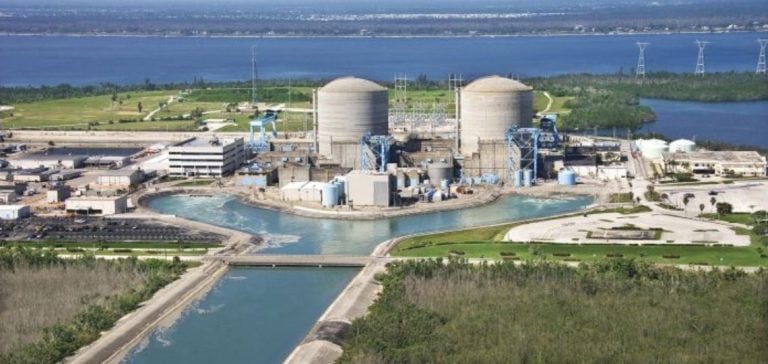The Nuclear Regulatory Commission (NRC) has approved the renewal of the operating license for units 3 and 4 of the Turkey Point nuclear power plant, located 40 kilometers south of Miami.
This renewal extends their operation until 2053.
This decision reinforces the presence of nuclear power in Florida’s energy mix and ensures stable electricity production for the region.
The two reactors concerned, commissioned in the 1970s, had already been the subject of an initial license extension in 2019, but additional revisions were requested by the NRC in 2022 to complete the environmental assessment.
The renewal dossier was re-examined in depth, with potential environmental impacts taken into account, culminating in final validation in September 2024.
A key role in decarbonization
Turkey Point’s license renewal is part of Florida’s broader decarbonization strategy, with nuclear power playing a central role in this objective.
With around 20% of the state’s energy mix coming from nuclear power, Turkey Point is making a significant contribution to reducing dependence on fossil fuels.
Unlike gas- or coal-fired power plants, nuclear reactors produce no carbon dioxide during operation, making them a clean and reliable source of energy for decades to come.
By supplying electricity to nearly a million homes, Turkey Point not only contributes to the state’s energy security, but also supports grid stability in response to Florida’s continuing population growth.
With the state attracting new residents every year, Turkey Point’s ability to meet energy demand is a major asset.
Economic and strategic challenges
The Turkey Point power station is not only a pillar of electricity generation.
It is also a major source of employment for the region.
Around 700 employees work there full-time, and during maintenance periods, this number can triple.
The facility also contributes to local tax revenues, paying over $37 million in taxes each year, strengthening the region’s economy.
On a strategic level, Turkey Point’s license extension strengthens the resilience of Florida’s power grid.
With dependence on renewable energies such as wind and solar subject to variable weather conditions, nuclear power offers a reliable and stable alternative.
It also keeps electricity production costs competitive, which is reflected in consumers’ bills.
Mastering environmental and technological challenges
Despite its strategic importance, Turkey Point is subject to increased environmental impact monitoring.
Located in the heart of a protected coastal zone, the facility has been the focus of several wildlife protection programs.
In particular, the plant is known for its crocodile monitoring program, which contributed to the reclassification of the species from “endangered” to “threatened”.
This type of initiative demonstrates the importance of reconciling energy production and environmental preservation.
Technologically, extending the life of nuclear reactors is a constant challenge.
NRC revisions include stringent safety and maintenance requirements, and regular equipment updates are necessary to ensure that the plant meets the latest safety standards.
The teams on site are therefore under continuous pressure to ensure incident-free operation.
A long-term vision
Turkey Point’s license renewal is part of a long-term vision for Florida’s energy future.
As the demand for electricity continues to grow, due to population growth and the electrification of sectors such as transportation, the sustainability of nuclear infrastructure is crucial.
Turkey Point, with its reactors extended until 2053, is positioned as a key solution for meeting this demand, while respecting the government’s decarbonization commitments.
At the same time, other nuclear power plants in the region, such as St. Lucie and Point Beach, are also being considered.
In parallel, other nuclear power plants in the region, such as St. Lucia and Point Beach, are also in the process of license renewal, testifying to the confidence of authorities and operators in the future of nuclear power in the United States.
Nuclear power’s role in the energy transition therefore remains crucial, particularly as Florida seeks to diversify its energy sources while reducing its greenhouse gas emissions.






















